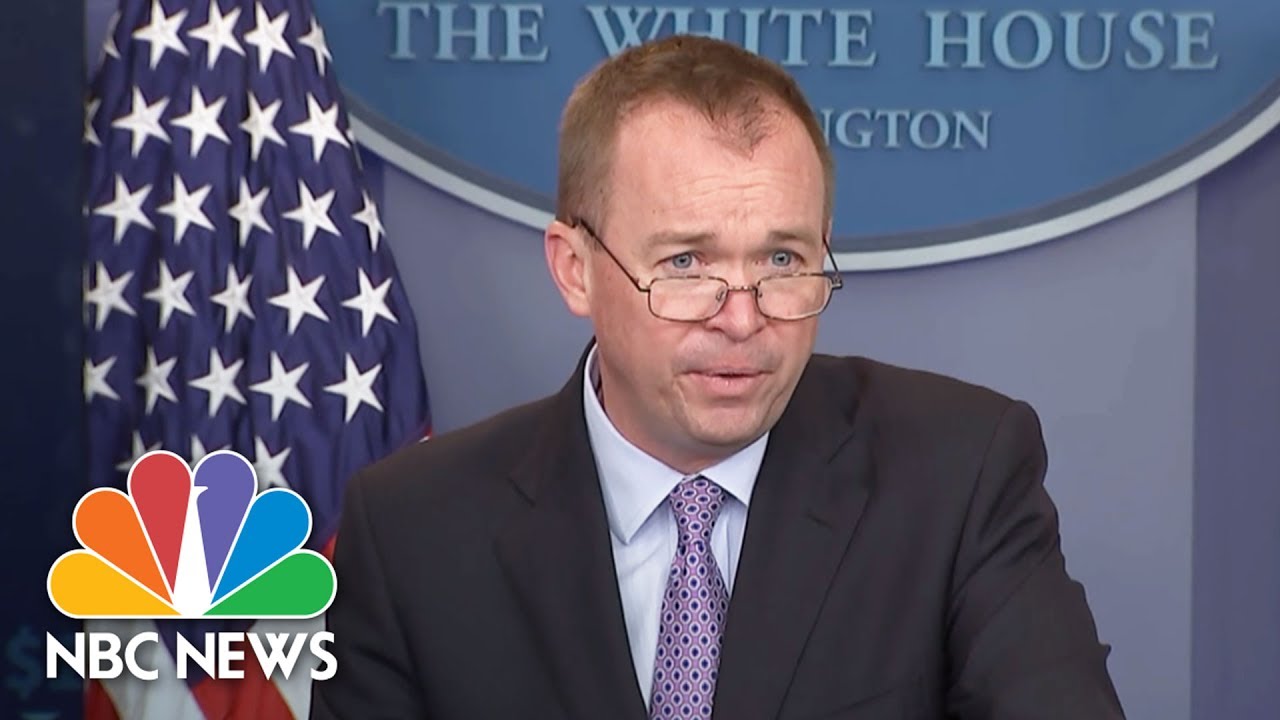“These changes threaten effective enforcement of civil rights laws and increase the likelihood that people will continue to face discriminatory access and pricing as they navigate their economic lives.”
By Jake Johnson, staff writer for CommonDreams. Published 2-1-2018

Mick Mulvaney press conference about President Donald Trump’s budget plan. Screenshot: YouTube
In a move immediately condemned as yet another “shameful” effort by the Trump administration to roll back civil rights and reward big banks, the White House reportedly “stripped” a key Consumer Financial Protection Bureau (CFPB) office of the power to take action against financial firms accused of breaking laws against racist lending practices.
Instead of enforcing anti-discrimination laws and penalizing criminal banks, the CFPB’s Office of Fair Lending and Equal Opportunity will now be focused on “advocacy, coordination, and education,” according to an email sent to bureau employees by White House budget chief Mick Mulvaney, who was installed as the CFPB’s acting director by President Donald Trump over objections of consumer advocates.
Thanks to this shift—first reported by The Intercept‘s David Dayen on Thursday—Mulvaney will now have full control of the lending office, which was previously outside of the CFPB head’s direct authority.
“For years, Mick Mulvaney opposed CFPB’s efforts to fight discrimination in the consumer financial marketplace,” Sen. Elizabeth Warren (D-Mass.) told The Intercept. “Mulvaney is putting the Office of Fair Lending under his control so that he can weaken it—leaving neighborhoods and consumers across the country more vulnerable to bias.”
Here’s how Trump’s CFPB is kicking off Black History Month https://t.co/heXYrejQOt
— David Dayen Pass-Through Vehicle LLC (@ddayen) February 1, 2018
Dodd-Frank mandated that CFPB create an Office of Fair Lending to oversee & enforce racial discrimination. Mick Mulvaney just transferred it into a personnel office https://t.co/TG63BUrorV
— David Dayen Pass-Through Vehicle LLC (@ddayen) February 1, 2018
“These changes, by an improperly appointed acting director, threaten effective enforcement of civil rights laws, and increase the likelihood that people will continue to face discriminatory access and pricing as they navigate their economic lives,” Lisa Donner, executive director of Americans for Financial Reform (AFR), said in a statement on Thursday.
In a rundown of the Fair Lending Office’s central achievements, AFR notes that the unit helped resolve “the largest redlining case in history against Hudson City Savings, which paid $33 million for lending assistance and community programs on behalf of majority black and Hispanic neighborhoods in New York, New Jersey, Connecticut, and Pennsylvania.”
Vanita Gupta, president and CEO of The Leadership Conference on Civil and Human Rights, warned in a statement that the move to strip the office of its enforcement abilities will empower the Trump administration to influence an office “that has traditionally been run by career civil servants.”
“These changes to the Office of Fair Lending and Equal Opportunity send a troubling message about the enforcement of civil rights laws and will harm people—especially in communities of color—who are wronged by payday lenders, debt collectors, or auto dealers, among others,” Gupta said. “The CFPB was created to protect consumers—but under the Trump administration, it is being transformed to protect powerful corporations instead.”
Trump boasts abt improving economic lot of African Americans & Hispanics, but is gutting the very effective CFPB office that I worked w/ at DOJ that enforces fair lending laws. Mulvaney hasn’t liked this office since his time as a congressman. https://t.co/herxOMmqLY
— Vanita Gupta (@vanitaguptaCR) February 1, 2018
Since taking over at the CFPB, Mulvaney—who in the past said the agency should not exist—has made clear his intention to undermine the bureau’s ability to protect consumers from predatory financial institutions.
And Mulvaney hasn’t been quiet about his objectives: In an op-ed for the Wall Street Journal last month, Mulvaney declared that “the days of aggressively ‘pushing the envelope'” on behalf of consumers “are over.”
Sen. Warren—who spearheaded the creation of the CFPB following the 2008 financial crisis—has argued that Mulvaney’s short tenure as CFPB director is enough to show he is “more interested in doing the bidding of big banks than standing up for American families.”
After the CFPB reversed course on a rule aimed at regulating payday lenders last month, Warren highlighted the fact that payday lenders have contributed $60,000 to Mulvaney’s political campaigns and demanded answers.
Payday lenders contributed over $60k to @MickMulvaneyOMB’s political campaigns. Now at the CFPB, Mulvaney is protecting predatory lenders instead of consumers. @RepMaxineWaters & I want to know if that’s more than coincidence. pic.twitter.com/0TdCDBkwSR
— Elizabeth Warren (@SenWarren) January 31, 2018
This work is licensed under a Creative Commons Attribution-Share Alike 3.0 License

